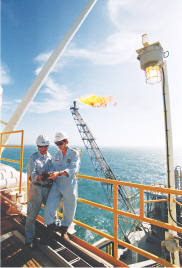KNOC Expands Overseas Operations
Company takes over oil firm in Kazakhstan to secure a base for Central Asian operations
 Korea National Oil Corp. (KNOC) has taken over an 85 percent stake of an oil company in Kazakhstan, the Ministry of Knowledge Economy said on Dec. 29.
Korea National Oil Corp. (KNOC) has taken over an 85 percent stake of an oil company in Kazakhstan, the Ministry of Knowledge Economy said on Dec. 29.
The ministry said Sumbe Oil Co., a mid-sized oil company in the central Asian country, has two oil blocs for development and exploration and KNOC bought shares through the Kazakhstan stock market worth $335 million and is now awaiting approval from the Kazakhstan authorities to officially conclude the deal. A Kazakh partner will hold a 15 percent stake in the oil company.
Sumbe currently operates the Aristan mining bloc estimated to contain 57.8 million barrels of oil deposits, including 5 million barrels of confirmed oil deposit and 52.8 million barrels of estimated oil deposit with another potential oil deposit of 20 million barrels. The company, in addition, has the right to explore for oil in the Kulzan mining bloc, which is yet to be explored.
KNOC feels that an increased amount of oil can be pumped from the Aristan oil bloc, as building pipelines and railroad in the area is not difficult, which will make oil drilling so much easier that crude oil production from the bloc can be expanded to 20,000 barrels per day.
If the support facilities for the oil field are built as projected, KNOC believes it will be able to recover its investment in five years.
In the meantime, the state-run oil company took over a number of oil companies overseas through M&As last year including Harvest Oil Co., a Canadian oil exploration company, for $3.95 billion on Oct. 22 last year, and Anco Energy Co., with oil fields in the Gulf of Mexico, in addition to an expansion of oil production at Petrotex in Peruto.
MKE officials said Kazakhstan would be a regional center for oil production in Central Asia now that the Sumbe oil bloc will be extensively explored to supply oil to the rest of the world.
KNOC will also get synergy from the ADA oil block nearby by sharing the accumulated experiences for oil exploration, personnel and equipment.
Korea¡¯s crude oil imports from January to October 2009 were 705.5 million barrels, 1.4 percent lower compared with the same period in 2008, owing to the decrease of production caused by the deteriorated refining margins and reduced crude oil run.
Imports from Africa and the Middle East shrank by 11.0 percent and 3.5 percent respectively from the previous year, while those from the Asia-Pacific region, such as Australia, Vietnam and Russia, increased by 13.2 percent from the same period a year earlier.
The dependence on the Middle East was reduced by 1.8 percentage points year-on-year to 84.3 percent. The average unit price of crude imports (on a CIF basis) from January to October 2009 slid to $57.73/bbl down from $107.15/bbl, a decline of $49.42/bbl compared with the same period in 2008. The amount of crude imports totaled $40.731 billion during the January to October 2009 period, a 46.9 percent decrease year-on-year, as the average unit price fell. October¡¯s unit price reached $71.06/bbl, still down $18.11/bbl.
In August 2003, KNOC presented its Principles of Ethics, which serves as a standard for ethical conduct. Through a declaration ceremony of the principles, KNOC demonstrated to the global industry its strong pursuit of ethical management.
To date, in order to create a clean, untainted corporation, KNOC has been building a variety of functions. Above all, to promote more efficient and systematic ethical management, KNOC developed reporting/rewarding, personnel appraisals and other ethical management systems.
In addition, not only did KNOC collaborate with the Korea Independent Commission Against Corruption and enter into a Pilot Project Agreement for Promoting Ethics in Public Enterprises, but it also signed a resolution for ethical management as a symbol of executive initiative.
KNOC will continue in its efforts to develop as a transparent, environmentally friendly public enterprise.
Ethical management means: working with a positive, subjective attitude; the observation of corporate ethics; carrying on all economic and legal responsibilities of the corporation; recognizing personal responsibilities as corporate obligations; and taking ethical aspects into consideration first when pursuing personal gains.
KNOC believes that ethical management is not just a management tool, but also a means by which the structure of the corporation can be strengthened. With conviction for this public value, KNOC and all its employees are actively carrying out ethical management. nw
A scene of an offshore oil operated by Korea National Oil Corp.
3Fl, 292-47, Shindang 6-dong, Chung-gu, Seoul, Korea 100-456
Tel : 82-2-2235-6114 / Fax : 82-2-2235-0799